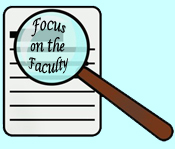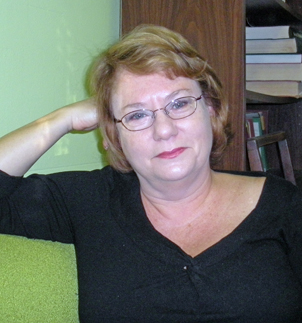Department of Sociology and Anthropology


If anything in her office portrays Dr. Von Bakanic's outgoing demeanor and passion for life, it is her lime-green walls. Also, the impressive collection of books gives insight into her love of research.
An associate professor of sociology, Bakanic's research focuses on the study of prejudices. She says she is continuously striving to learn more about the attitudes and behaviors of society.
"What I'm trying to accomplish is getting people to understand that prejudices aren't something that you can just shove under the rug and pretend you don't have," Bakanic explained." It's a better strategy to understand how we use prejudices, what they do for us, and why we can't completely suppress them."
Bakanic became interested in the study of prejudices while residing in Mississippi. Originally from Pittsburgh, Pa, Bakanic felt she was more aware of the area's prejudices because she was an outsider, a "Yankee."
"Had I grown up in that culture they would probably not have seemed so blatant," Bakanic reflects, "and not all of the prejudices I encountered in Mississippi were racial ones. In fact the first prejudices I noticed were regional and gender prejudices because those were the characteristics that put obstacles in my way personally."
Bakanic came to Charleston in 1992 to live closer to family and teach at the College. Since then she has completed many projects in the sociology field. Bakanic has written several papers on Latino prejudices and how white people in the area have dealt with the massive increase of Latino population in the last decade. She says that white people can be impolite to Latinos without understanding that they are being prejudiced. She says whites felt they had permission from the mass media which was covering the immigration issue at the time. The public automatically considered all Mexicans as illegal immigrants, she contends.
Bakanic says she finds it interesting that although white people understand it is not acceptable to be prejudiced towards African Americans, they do not see the way they treat Latinos as the same phenomena.
In 2005 Bakanic performed a study with the Crime Victim Center at MUSC. These data concluded that although the rate of reported sexual assaults on campus was similar to the national average, there was a much higher percentage of people who experience secondary victimization than researchers previously realized. Bakanic and her colleagues' data from this study has recently been published in the Journal of American College Health.
The Campus Climate study that Bakanic was a part of in 2006-2007 remains the largest study ever conducted at the College of Charleston with more than 3,400 participants. This study looked at how different groups on campus interacted with each other. Bakanic found that the majority of people were comfortable with the climate of our campus.
Bakanic published a book in 2009 titled "Prejudice: Attitudes about Race, Class and Gender." It looks at how people use their prejudices to construct their understanding of what's going on around them," she says.
Bakanic is continuously conducting research. Presently the professor is writing an article on gender prejudices. She is looking at why people do not believe they have them, but really do. Also, she is studying why people understand that it is wrong to be racist but never learned the same lesson about sexism. Bakanic will submit the article for publication in a peer reviewed academic journal within the next few months.
Including students in her work is also important to Bakanic. She is currently analyzing data with her colleagues and students about who sexual assault victims confide in after being attacked. Is it someone with whom they have a strong tie, such as a family member or good friend, or a weak tie, such as a counselor or teacher? Results show that those who involve a strong-tie in their victimization handle the situation better.
Bakanic also teaches a content analysis class in which students analyze answers to open-ended questions collected in a survey and try to interpret them and find patterns or similarities in their responses. Their goal is to determine whether people who express similar ideas in their messages possess other similarities such as expressing the same prejudices or characteristics such as being the same gender, race or religion.
Cameron Scott Fairley, a senior in Bakanic's content analysis class, says, "She likes to get the class engaged in the content of the course and is very passionate about her work. She encourages classroom discussion and makes the coursework interesting."
Bakanic is also known for helping students past course conclusion. A colleague of hers, Dr.Tracy Burkett, describes Bakanic as "a dedicated teacher-scholar. She involves students in her research, takes groups to professional meetings and mentors students past graduation."
Bakanic has received much recognition for her work. She has earned many grants for her research projects and additional funding from the College of Charleston Office of Diversity. In 2004 Bakanic even received a special award created specifically for her by the sociology department for services above and beyond the call of duty.
###